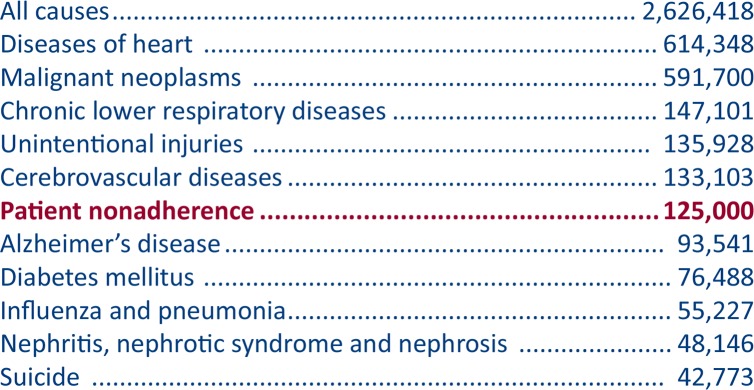The New York Times says nonadherence* to prescribed medications is “an out-of-control epidemic” in the U.S. and quotes a review in Annals of Internal Medicine, which found “20–30% of medication prescriptions are never filled, and approximately 50% of medications for chronic illness are not taken as prescribed.”
For example, “a third of kidney transplant patients don’t take their anti-rejection medications, 41% of heart attack patients don’t take their blood pressure medications, and half of children with asthma either don’t use their inhalers at all or use them inconsistently.”
Many reasons for nonadherence were discussed — aversion to chemicals, a desire to do things “naturally,” pills represent reminders of sickness, self-experimentation with stopping medications and noticing no change in perceived health, and drug costs.
Another Times piece discussed a study showing that Medicare patients fail to adhere to prescriptions for high-intensity statins. At six months after discharge, 58.9% were taking their high-intensity statins as prescribed, and at two years, the percentage had fallen to 41.6%.
The study involved almost 30,000 Medicare beneficiaries who all had Medicare fee-for-service and pharmacy benefits coverage.
In addition to the reasons listed above, some say the problem must be because doctors are not to educating their patients about the importance of taking their medications.
From the Times: the senior author of the statin study, Dr. Robert S. Rosenson, a professor of medicine at the Icahn School of Medicine at Mt. Sinai, said, “Health care providers have an obligation to educate the patient. We need to stress the evidence that supports the therapy. People who continue the medicine have progressively fewer adverse outcomes over time. Once you have a heart attack, this is prevention for the rest of your life.”
However, the full text of the paper does not mention the words “educate” or “education.” What the paper says is this: “Reasons for statin down-titration or discontinuation were not analyzed because these data are not available in Medicare claims. Lower medication costs, cardiologist visits, and cardiac rehabilitation may [emphasis mine] contribute to improving high-intensity statin use and adherence after myocardial infarction.”
The Annals review estimated that nonadherence leads to 125,000 deaths and as many as 10% of hospitalizations every year at a cost of at least $100 billion—possibly as high as $289 billion.
Consider this. If the Centers for Disease Control and Prevention tracked medication nonadherence, it would rank as the sixth leading cause of death in this country. The most current data are from the CDC’s report, Health in the U.S., Table 19. See Figure 1 with medication adherence added.
Figure 1.
Health in the U.S., Causes of Death for 2014
Adopted and amended from Centers for Disease Control, Table 19, Leading causes of death and numbers of deaths, 2014
Let’s look at another issue — cigarette smoking. Despite extensive educational and other measures, it has taken more than 50 years to reduce the percentage of US adults who smoke cigarettes from >42% to about 15% which means 36 million people still smoke.
Rather than blaming doctors for the problem of medication nonadherence, let’s focus on ways to enlighten the patients. No foundations or patient advocate groups are promoting awareness of nonadherence. There are no colored ribbons, no fundraising walks, runs, jogs, trots, or swims.
For starters, I suggest this slogan, “If you want to make it, you’ve got to take it.
Biography
Skeptical Scalpel is a retired surgeon and was a surgical department chairman and residency program director for many years. He is board-certified in general surgery and critical care and has re-certified in both several times. He blogs at SkepticalScalpel.blogspot.com and tweets as @SkepticScalpel.
Contact: SkepticalScalpel@hotmail.com
Reprinted with permission.
Footnotes
Editor’s Note: Many physicians, including myself, continue to use the word ‘noncompliant’ for this problem. That is now deemed politically incorrect by the word police.



